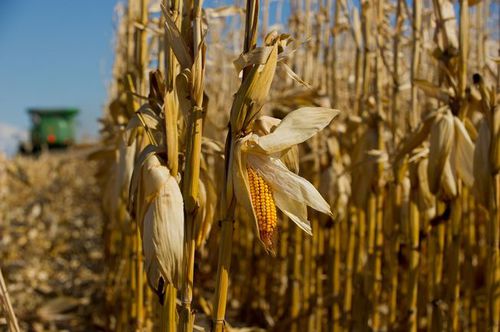December 8, 2017
Global Stagnation Projected on Crop Yield Increase under Climate Change Development, Diffusion of Adaptation Technology Now More Important
Keywords: Climate Change Adaptation Environmental Technology Food

Image by United Soybean Board Some Rights Reserved.
Japanese Institutions, including the Institute for Agro-Environmental Sciences of NARO, the Japan International Research Center for Agricultural Science and the National Institute for Environmental Studies, released on August 28, 2017, a prediction of global stagnation of crop yields in response to climate change, drawn from their collaborative study to project the impact of climate change on world wide yield growth of major crops (maize, rice, wheat, and soybean).
They projected the impact of climate change on the yields of major crops in each area of the world expressed on a high-resolution image of 50 kilometer-mesh density using numerical models translating physiological and ecological growing processes of crops into numerical expressions. On presuming crop yields, they considered technological improvements that should gain popularity in developing countries as their economies develop, such as fertilization management and use of high yielding varieties, as well as measures that can be easily taken, like shifting sowing dates.
The study found that the yield increase of maize and soybean at the end of this century will stagnate, even if the global mean temperature rise at the end of this century is less than 1.8°C from pre-industrial levels; the higher the temperature rises the lower the yield increases. On the other hand, the yield increases for rice and wheat will not be markedly influenced while the temperature rise is under 3.2°C, but will start to stagnate when the temperature rise exceeds 3.2°C.
In order to meet the increasing world food-demand, we have to maintain yield increases under future climate change. The results suggest that it is necessary to further diffuse the advanced technology currently available to farmers in developing countries to maintain yield increases. In addition, it suggests that there is a need to accelerate the development and diffusion of more aggressive adaptation technology, such as high-temperature resistant varieties and irrigation and drainage facilities.
Related JFS Articles
Related
"JFS Newsletter"
- Fifth Contest to Award Excellent Environmental and Social Practices by Junior High, High School Students
- Coco Farm & Winery: An Amazing Model of Special Needs Students and Community
- Locally Produced Food in School Lunches----A Challenge by Nyuzen, Japan
- Seikatsu Club: Japanese Cooperative Managed by Members' Will to Confront Social Problems
- Increase Revenues without Increasing Catches -- How the Sustainable Sakura Shrimp Fishery in Suruga Bay Does It
Related
"Popular Articles"
- Yukiguni Maitake and Grameen Group Launching Joint Mung Bean Project in Bangladesh
- Japan's Food Self-Sufficiency Ratio Unchanged at 40% for 8 Years
- Food Pictograms Used at APEC SME Summit 2010
- Rental Organic Farm Provides Farmland for Housing Development Project
- Greenpeace Survey Ranks Five Top Japanese Supermarket Chains for Fish Safety, Finds Problems


